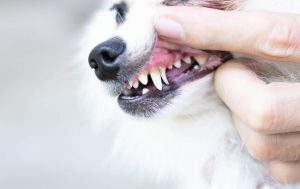Diagnosing and Treating Dental Disease in Dogs
 The pet health care environment is rapidly expanding and improving. In fact, veterinary health care recommendations are becoming comparable to recommendations our own doctors and dentists give us. Take dental care for example, we know what would happen to our teeth if we never brushed them, think about those lovely pirate images. The same level of disease and decay occur in our pet’s mouths when basic dental care is not provided. Cheers to those pet parents who start their pet’s young, use positive reinforcement, and have worked tooth brushing and care into their daily routine. However, despite even the most diligent flossers, teeth need a thorough professional examination and cleaning. Dental disease in dogs can lead to a lot of other serious health issues, and our team is here to provide thorough preventative care to help you avoid this in your pets.
The pet health care environment is rapidly expanding and improving. In fact, veterinary health care recommendations are becoming comparable to recommendations our own doctors and dentists give us. Take dental care for example, we know what would happen to our teeth if we never brushed them, think about those lovely pirate images. The same level of disease and decay occur in our pet’s mouths when basic dental care is not provided. Cheers to those pet parents who start their pet’s young, use positive reinforcement, and have worked tooth brushing and care into their daily routine. However, despite even the most diligent flossers, teeth need a thorough professional examination and cleaning. Dental disease in dogs can lead to a lot of other serious health issues, and our team is here to provide thorough preventative care to help you avoid this in your pets.
Unfortunately, it is impossible for your veterinarian to completely evaluate your pet’s teeth while your pet is awake and alert. Furthermore, at least 70% of dental disease is actually below the gum line. It is in your pet’s best interest to undergo general anesthesia for this procedure. While your pet is safely anesthetized your veterinarian will closely evaluate your pet’s gums and teeth. Each tooth is probed for evidence of pocketing, gum recession, redness, swelling, abscesses, masses, or other abnormalities. If evaluation is suggestive of dental disease, Longwood Veterinary Center has a dental digital radiography machine to obtain digital images of the tooth root. This further evaluates the tooth for radiographic signs of fracture, resorption, or abcessation.
After a thorough oral exam, a deep cleaning will be performed. A high pressure water scaler will be used to remove thick tartar and calculus. The nurse will use hand tools for detail work in all the nooks and crannies. Many times after cleaning the teeth, signs of disease will become more obvious. Reviewing exam findings and digital x-rays, the nurse and doctor will create a plan for care. In some cases this requires extraction of diseased teeth. Diseased teeth are a cause of pain and chronic inflammation. If radiographs indicate bone loss of 50% or greater around a root, there is a root fracture, or an abscess around the root, the tooth should be extracted.
If your pet needs a tooth extracted, it is not as simple as tying one end of a string to the tooth and the other to a door knob! Canine and feline patients have evolved with deep and long tooth roots. Extraction of a tooth often becomes a surgical procedure. This precise work, is a fine art performed by skilled veterinarians. Following any necessary extractions or other treatments, each tooth will be carefully polished to prevent tartar adhering to enamel. Needless to say, a dental cleaning is not an easy procedure, but it is necessary for the overall health of your pet. Periodontal disease affects all of the body systems and if left untreated can lead to the spread of infection to the heart, kidneys, liver, and other organs.
Longwood Veterinary Center is an AAHA-accredited practice. This means we voluntarily adhere to the highest standards of veterinary medicine. You can rest assured your pet will not only receive the best medical recommendations, but also every convenience. From anti-anxiety medications and gentle restraint, to a soft quiet recovery area- we take the time to make sure our patients are as comfortable as possible. When it is time to go home, our extremely qualified nurses will review with you the exam findings, radiographs, and post-op care for your pet. If you have any questions, please contact us. A pearly white smile for your furry friend is just a phone call away!
Written By: Corrina Parsons, VMD and Tara Corridori, LVT
